Aquatic therapy greatly boosts your mental wellbeing through water’s unique therapeutic properties that reduce stress and anxiety while promoting social connection. You’ll experience endorphin release during gentle water exercises, creating a natural mood elevation with buoyancy relieving physical tension. Group sessions combat isolation by fostering meaningful relationships, while mindful movements like Ai Chi enhance cognitive function and emotional balance. The supportive aquatic environment helps you build confidence, develop stronger coping mechanisms, and maintain long-term mental health improvements that’ll transform your daily life.
The Science Behind Water-Based Mental Health Benefits
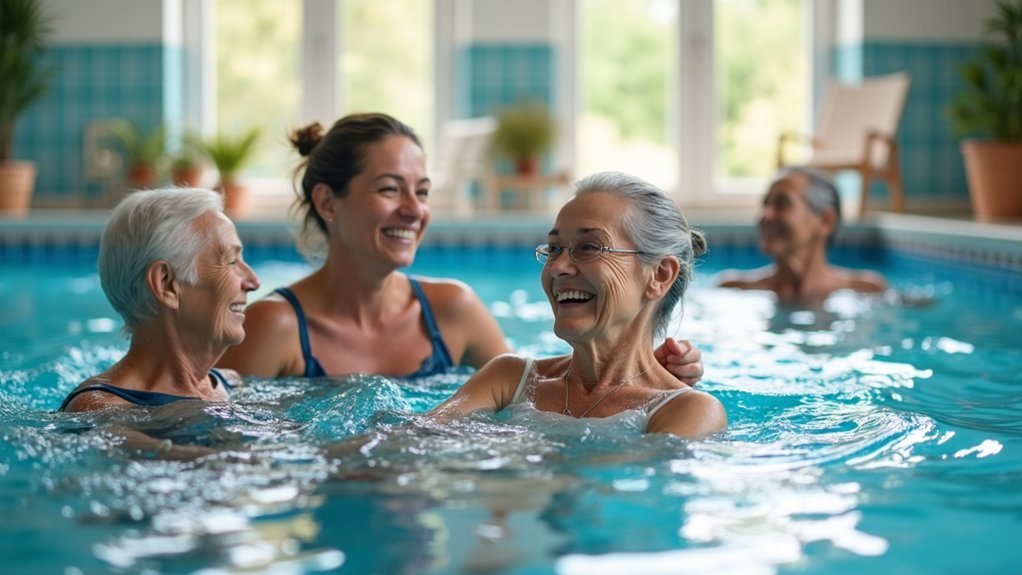
When you step into warm water for aquatic therapy, you’re not just engaging in physical exercise—you’re participating in a scientifically-backed intervention that can dramatically improve your mental health.
Research demonstrates that water-based exercises deliver mental health advantages with a standardized mean difference of -0.77, indicating powerful therapeutic effects.
The aquatic environment naturally promotes relaxation and endorphin release, leading to improved mood and reduced anxiety levels.
You’ll experience enhanced psychological well-being as the water’s supportive properties create conditions for emotional healing. This makes aquatic therapy particularly effective for managing depression and anxiety, especially if you’re dealing with chronic conditions like fibromyalgia.
The combination of physical movement and water’s therapeutic qualities provides a holistic approach to mental wellness.
How Aquatic Environments Reduce Stress and Anxiety
Why do aquatic environments prove so effective at melting away stress and anxiety? The buoyancy of water creates a weightless sensation that relieves pain and physical tension you’d normally experience during exercise.
This unique environment supports both your mental and physical health simultaneously. Warm therapy pool temperatures between 83-88°F promote muscle relaxation while enhancing circulation, creating a naturally calming atmosphere that reduces anxiety levels.
Water-based exercises trigger endorphin release—your body’s natural stress-fighting hormones that elevate mood.
Additionally, group aquatic therapy sessions encourage social interaction, combating loneliness that often contributes to elderly anxiety. Research shows you’ll experience greater psychological benefits when participating twice weekly rather than once.
This combination of physical comfort, hormonal responses, and community connection makes aquatic environments uniquely powerful for stress reduction.
Endorphin Release Through Gentle Water Exercises
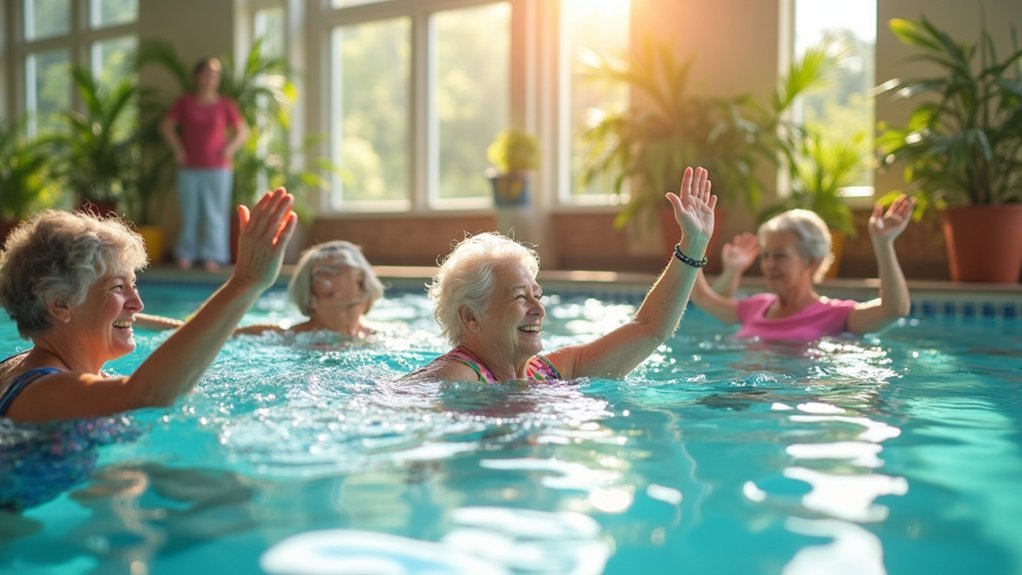
The euphoria you experience during gentle water exercises stems directly from your body’s natural endorphin release—those powerful “feel-good” hormones that transform your mood and melt away anxiety.
The endorphin rush from water exercise naturally transforms your mood and dissolves stress through your body’s powerful hormonal response.
Water’s buoyant properties reduce joint strain, enabling you to engage in physical activities that stimulate endorphin production more comfortably than land-based exercises.
When you participate in water exercises like aquatic aerobics, you’ll notice significant improvements in your mental health.
Research confirms that regular aquatic therapy reduces depression and anxiety symptoms while enhancing your overall well-being.
Group sessions amplify these benefits by fostering social connections and community support.
Your consistent participation in water-based activities builds psychological resilience and dramatically improves your quality of life, making endorphin release a cornerstone of effective aquatic therapy.
Building Social Connections in Group Aquatic Sessions
Beyond individual benefits, group aquatic sessions create powerful social bonds that transform your therapeutic experience into meaningful community connections.
When you participate twice weekly, you’ll experience amplified psychological benefits that combat loneliness and isolation. The social benefits extend far beyond physical exercise, fostering emotional health through shared experiences and mutual support.
Group aquatic sessions enhance your mental well-being through:
- Laughter and conversation flowing naturally during water movements
- Encouraging smiles exchanged between exercise partners
- Gentle coaching moments shared among participants
- Celebratory high-fives after completing challenging movements
- Warm embraces and farewell waves at session’s end
These meaningful interactions reduce anxiety levels while building mental resilience.
You’ll discover that the enjoyable, supportive atmosphere motivates continued participation, creating lasting friendships that extend beyond the pool environment and contribute greatly to your overall quality of life.
Combating Depression With Therapeutic Water Activities
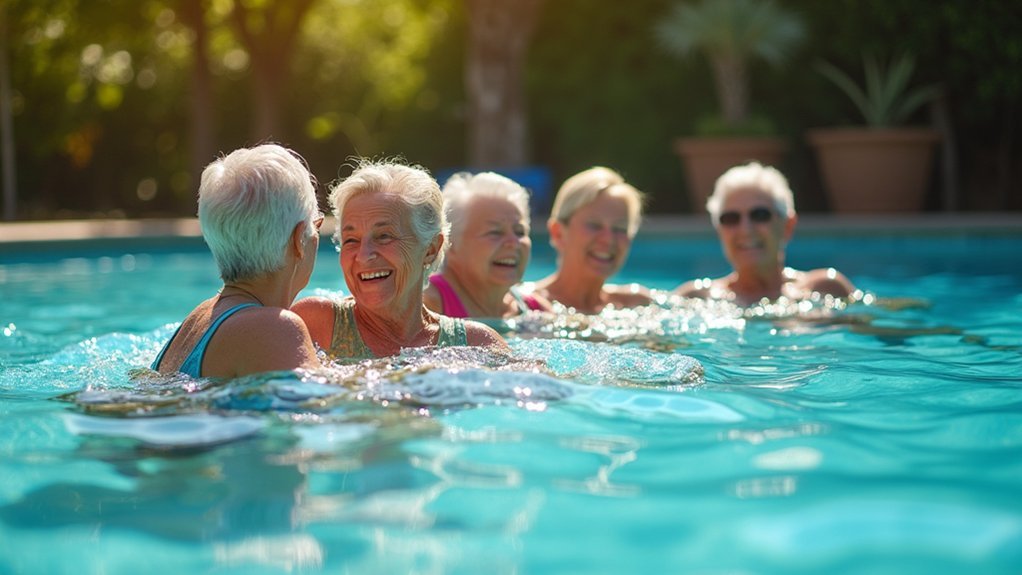
When depression clouds your golden years, therapeutic water activities offer a scientifically-backed pathway to brighter mental health. Aquatic therapy demonstrates remarkable effectiveness for elderly individuals, with research showing a standardized mean difference of -0.77 in mental health improvements.
You’ll experience significant mood enhancement as water-based exercises trigger endorphin release, naturally combating anxiety and depression. The buoyant environment allows you to move comfortably, creating joyful movement experiences that directly counter depressive symptoms.
Whether you’re a stroke survivor or simply seeking emotional wellness, aquatic therapy enhances both physical capacity and emotional status simultaneously. You’ll find that the supportive water environment enables therapeutic activities that feel satisfying rather than burdensome, making depression management more achievable and sustainable.
The Role of Warm Water in Emotional Regulation
When you immerse yourself in warm water heated to 83-88°F, you’ll experience immediate stress reduction as the temperature triggers muscle relaxation and promotes the release of mood-enhancing endorphins.
The consistent warmth creates a stabilizing effect on your emotional state, helping you maintain better control over anxiety and mood fluctuations that commonly affect elderly individuals.
This therapeutic heat environment naturally calms your nervous system, allowing you to achieve a deeper sense of emotional balance and tranquility.
Warm Water Reduces Stress
As you step into warm water heated between 83-88°F during aquatic therapy, your muscles immediately begin to relax while your blood circulation improves, creating a natural pathway to stress reduction.
This therapeutic environment directly impacts your mental health by promoting emotional stability through physiological changes.
The warm water experience creates powerful stress-relieving sensations:
- Your body weight feels lighter as buoyancy lifts pressure from aching joints
- Gentle warmth envelops your skin like a comforting embrace
- Tension melts away from your shoulders and neck muscles
- Your breathing naturally deepens and slows in the soothing environment
- Endorphins flood your system, replacing anxiety with calm contentment
This combination of physical relief and hormonal response transforms your stress levels, making warm water therapy an effective tool for maintaining emotional balance and psychological wellbeing.
Temperature Enhances Mood Stability
Beyond reducing stress, warm water therapy creates a biological foundation for sustained emotional balance that extends well beyond your therapy session.
When you immerse yourself in water heated to 83-88°F, the ideal temperature triggers endorphin release—your body’s natural mood elevators. This biochemical response directly combats anxiety while promoting lasting emotional stability.
The warm temperature enhances blood circulation, delivering oxygen and nutrients that support your mental health.
As buoyancy reduces joint stress, you’ll engage in comfortable movement that strengthens the connection between physical activity and psychological well-being.
Regular participation considerably decreases depression and anxiety symptoms, dramatically improving your quality of life.
Combined with social interaction during group sessions, this temperature-controlled environment fosters emotional resilience and community support.
Heat Promotes Emotional Calm
While your body naturally responds to temperature changes, warm water’s therapeutic heat creates a uniquely powerful pathway to emotional calm that transforms how you process stress and anxiety.
The soothing 83-88°F environment enhances your emotional well-being by creating a sanctuary where psychological conditions can heal naturally.
This therapeutic warmth triggers profound changes in your mental state:
- Muscle tension melts away – releasing physical stress stored in your shoulders and neck
- Blood flow increases – delivering oxygen-rich nutrients that calm your nervous system
- Endorphins flood your system – creating natural mood elevation and pain relief
- Cortisol levels decrease – reducing your body’s primary stress hormone
- Heart rate stabilizes – promoting deep relaxation and mental clarity
Through consistent exposure, warm water becomes your ally in stress reduction and emotional regulation.
Enhancing Self-Esteem Through Improved Physical Function
When you participate in aquatic therapy, you’ll notice your physical strength improving week by week. This newfound capability directly translates into greater confidence in your daily activities.
As your balance and mobility enhance through water-based exercises, you’ll regain the independence that may have diminished over time, restoring a deep sense of personal pride. Your ability to move more freely and accomplish tasks you once struggled with doesn’t just improve your physical health—it fundamentally transforms how you view yourself and your capabilities.
Strength Builds Confidence
Physical strength serves as the foundation for psychological confidence, and aquatic therapy delivers both in remarkable ways for elderly individuals.
When you engage in strength training within water’s supportive environment, you’ll discover newfound physical capabilities that directly enhance your mental wellbeing.
The water’s buoyancy allows you to perform exercises that seem impossible on land, creating powerful confidence-building moments:
- You’ll execute squats and lunges with reduced joint stress
- Your balance improves as water provides gentle resistance and support
- Weakened muscles regain strength through consistent aquatic movements
- Range of motion increases without fear of falling
- Cardiovascular endurance builds gradually and safely
This enhanced physical function translates into real-world independence, empowering you to tackle daily activities with renewed self-assurance and energy.
Independence Restores Pride
Independence becomes the cornerstone of dignity as you rediscover your ability to navigate daily life without constant assistance. Aquatic therapy transforms your physical capabilities, allowing you to perform essential activities that once seemed challenging. This renewed independence directly elevates your self-esteem and restores the pride that comes from self-reliance.
| Physical Improvement | Impact on Independence |
|---|---|
| Enhanced muscle strength | Easier household tasks |
| Better balance control | Confident walking/moving |
| Increased mobility range | Greater activity participation |
| Reduced fall risk | Independent community engagement |
When you’re able to move freely and safely, you’ll naturally seek more social interaction. This increased community involvement reinforces positive self-perception and greatly improves your emotional well-being, creating an upward spiral of confidence and mental health benefits.
Mindfulness and Relaxation Techniques in Aquatic Settings
While traditional meditation might seem challenging on dry land, the aquatic environment naturally enhances mindfulness practices for elderly individuals seeking deeper relaxation and mental clarity.
You’ll discover that aquatic therapy transforms your meditation experience through specialized techniques like Ai Chi, which blends Tai Chi and Qigong movements in warm water. This combination naturally promotes emotional resilience while reducing stress and anxiety.
The warm water environment supports your breathing exercises and creates ideal conditions for mindfulness practice:
- Gentle water resistance guides your focused movements
- Buoyancy reduces joint pressure, enabling comfortable positioning
- Warm temperatures naturally relax tense muscles
- Water sounds create calming background meditation
- Group sessions foster supportive social connections
You’ll experience increased endorphin release during regular sessions, improving your mood and psychological health while building lasting community bonds with fellow participants.
Creating Safe Spaces for Elderly Emotional Expression
Creating a safe emotional space becomes essential when elderly individuals need to express their feelings and process complex emotions through aquatic therapy.
You’ll find that water’s buoyancy naturally reduces physical barriers, allowing participants to move confidently without fear of injury. This physical freedom translates into emotional openness, where you can share experiences and feelings more readily.
The warm, calming environment encourages authentic emotional expression while group sessions foster meaningful connections between participants.
You’ll notice how sharing stories and emotions with peers reduces loneliness and builds community support.
The supportive environment created through consistent aquatic therapy sessions leads to improved mood and significant enhancements in overall emotional well-being, making these therapeutic spaces invaluable for elderly mental health.
The Impact of Buoyancy on Psychological Comfort
When you’re suspended in water, the buoyant forces eliminate the weight-bearing stress on your body, which directly translates to reduced mental tension and anxiety.
You’ll discover that this weightless environment creates a profound sense of emotional security, as the fear of falling or physical strain melts away with each movement.
The psychological comfort you experience stems from your body’s natural response to buoyancy – releasing endorphins while fostering confidence in your ability to move freely and safely.
Weightlessness Reduces Mental Stress
As gravity’s weight lifts away in water, your mind experiences a profound shift toward calm and relaxation. The weightlessness you feel during aquatic therapy creates an immediate reduction in mental stress, allowing your psychological barriers to dissolve.
This buoyancy-induced freedom transforms how you perceive physical limitations, directly benefiting your mental health.
When you’re suspended in warm water, you’ll notice:
- Your shoulders naturally drop as physical tension releases
- Breathing becomes deeper and more rhythmic
- Anxious thoughts begin to quiet and fade
- A sense of floating peace envelops your entire being
- Mental clarity emerges as stress hormones decrease
This weightless environment enables movements you thought impossible, creating accomplishment and joy.
The supportive water cradles your body while simultaneously lifting your spirits, proving that buoyancy offers both physical and emotional relief.
Buoyancy Enhances Emotional Security
Beyond the immediate stress relief that weightlessness provides, buoyancy creates a deeper psychological foundation of safety and security that transforms your entire therapeutic experience.
When water supports your body weight, you’ll discover newfound confidence in movement, eliminating the fear of falling or injury that often restricts land-based activities.
This enhanced emotional security through buoyancy directly impacts your mental health by reducing anxiety and fostering comfort during sessions.
You’ll find yourself attempting exercises that seemed impossible on land, building both physical capability and psychological resilience.
The supportive aquatic environment encourages social interactions with fellow participants, strengthening community bonds essential for emotional wellbeing.
Through aquatic therapy, buoyancy becomes your ally in developing lasting confidence and emotional stability.
Ai Chi and Mental Clarity for Older Adults
While traditional land-based exercises can feel challenging for aging bodies, Ai Chi offers a revolutionary approach that harnesses water’s natural properties to enhance mental clarity in older adults. This gentle aquatic technique combines Tai Chi and Qigong movements in warm water, creating an ideal environment for cognitive enhancement.
You’ll experience significant improvements through:
- Flowing movements that sharpen focus and concentration
- Reduced anxiety levels through meditative water-based practice
- Enhanced balance and coordination boosting your confidence
- Social connections formed during group sessions
- Stress reduction promoting overall mental well-being
Regular Ai Chi practice transforms your mental state by improving body awareness while the water’s buoyancy supports gentle movement.
You’ll find that this innovative approach not only enhances mental clarity but also reduces fall risk through improved balance.
Addressing Isolation Through Community Water Programs
You’ll discover that community water programs offer powerful social benefits through group sessions, where you can connect with peers who understand your challenges and experiences.
These aquatic environments naturally foster community bonds as you participate in exercises alongside others, creating opportunities for meaningful conversations and shared encouragement.
Group Session Social Benefits
When elderly individuals step into group aquatic therapy sessions, they’re entering more than just a pool—they’re joining a vibrant community that can transform their social well-being. This group aquatic therapy environment naturally promotes social interaction among participants, creating bonds that extend beyond exercise routines.
Through community engagement, you’ll discover improved mental well-being compared to exercising alone.
The social benefits create vivid imagery of connection:
- Shared laughter echoing across warm pool waters during gentle exercises
- Encouraging voices cheering each other through challenging movements
- Friendship circles forming around poolside conversations after sessions
- Supportive hands reaching out when someone needs assistance
- Bright smiles exchanged between participants celebrating small victories
These shared experiences boost motivation and enjoyment while building emotional resilience.
You’re not just improving physical health—you’re cultivating meaningful relationships that combat loneliness and isolation.
Building Aquatic Community Bonds
Although isolation affects millions of seniors worldwide, community water programs serve as powerful antidotes that transform solitary struggles into shared triumphs.
You’ll discover that building aquatic community bonds creates lasting connections beyond the pool deck. When you participate in group aquatic therapy, you’re not just exercising—you’re weaving yourself into a supportive network of peers who understand your journey.
These water-based communities foster meaningful social interaction through shared experiences and mutual encouragement.
You’ll find that regular participation strengthens your emotional resilience as you support others and receive support in return. The pool becomes your meeting ground where friendship flows naturally, replacing isolation with belonging.
Through community water programs, you’re creating relationships that enhance both your mental wellbeing and overall life satisfaction.
Reducing Loneliness Through Exercise
Since loneliness can feel as overwhelming as drowning, community water programs offer lifelines that pull you toward meaningful connections.
These therapeutic sessions create environments where social interaction flows naturally, transforming isolated individuals into supportive communities.
When you participate in group aquatic exercises, you’re not just improving physical health—you’re actively reducing anxiety and depression through endorphin release and meaningful social bonds.
Research shows attending sessions twice weekly maximizes mental health benefits.
- Gentle water movements washing away stress and worry
- Laughter echoing across pool surfaces during group activities
- Supportive hands reaching out during partner exercises
- Warm conversations flowing in post-session relaxation areas
- New friendships forming like ripples spreading across water
Community water programs provide consistent platforms for emotional connection, fostering resilience and belonging among elderly participants.
Cognitive Benefits of Coordinated Water Movements
As you move through water in coordinated patterns, your brain actively forms new neural pathways while strengthening existing connections. This enhanced cognitive function occurs because water-based exercises engage multiple brain regions simultaneously, improving your attention span and memory retention.
You’ll notice improved mental agility as coordinated movements challenge your executive function, requiring you to process complex sequences while maintaining balance and rhythm. The rhythmic nature of synchronized aquatic activities promotes mindfulness and body awareness, sharpening your cognitive processing abilities.
When you participate in group sessions, social interaction further stimulates your brain, creating additional cognitive benefits. Research demonstrates that these coordinated water movements considerably reduce cognitive decline, helping you maintain sharper thinking skills and better mental clarity as you age.
Long-Term Mental Health Improvements Through Consistent Practice
When you commit to regular aquatic therapy sessions, your mental health undergoes profound transformations that extend far beyond immediate mood improvements. Research demonstrates that consistent participation produces a standardized mean difference of -0.77, indicating significant symptom reduction in mental disorders among elderly participants.
Your twice-weekly sessions create lasting changes in your psychological well-being:
- Enhanced emotional resilience – You’ll develop stronger coping mechanisms for daily stressors
- Improved social connections – You’ll build meaningful relationships within your therapy group
- Reduced anxiety patterns – You’ll experience calmer mental states throughout your week
- Elevated mood stability – You’ll maintain more consistent emotional balance
- Strengthened mental fortitude – You’ll face challenges with greater confidence
This holistic aquatic therapy approach addresses both physical and mental health simultaneously, ensuring your quality of life improvements become permanent fixtures rather than temporary benefits.
Frequently Asked Questions
Why Is Aquatic Therapy Good for Seniors?
You’ll experience reduced joint stress from water’s buoyancy, allowing comfortable movement despite arthritis. Water exercises release endorphins, boosting your mood while decreasing anxiety and depression. You’ll also build social connections during group sessions.
How Does Hydrotherapy Help Mental Health?
Hydrotherapy boosts your mental health by releasing mood-improving endorphins, reducing stress through warm water immersion, and creating calming environments that enhance emotional healing while markedly decreasing anxiety and depression symptoms.
What Are the Psychological Benefits of Aquatic Therapy?
You’ll experience reduced depression and anxiety through aquatic therapy’s mood-boosting effects. You’ll build social connections during group sessions, combating loneliness while improving your emotional state and overall psychological well-being greatly.
Who Should Not Do Aquatic Therapy?
You shouldn’t do aquatic therapy if you’ve got severe heart or lung conditions, open wounds, infectious skin diseases, uncontrolled seizures, unstable fractures, or can’t follow safety directions independently.
In Summary
You’ll find that aquatic therapy offers a powerful pathway to enhanced mental wellbeing in your golden years. Through water’s natural stress-reducing properties, gentle exercise, and social connections, you’re not just maintaining your mental health—you’re actively improving it. Don’t underestimate the profound impact of consistent water-based activities on your mood, cognitive function, and overall quality of life. Immerse yourself in aquatic therapy and experience the transformation.


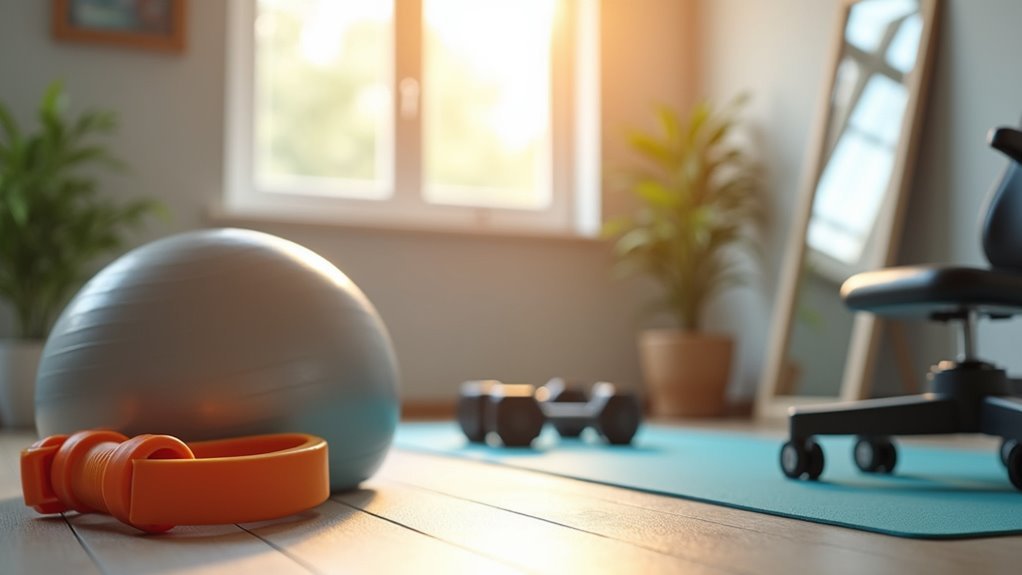
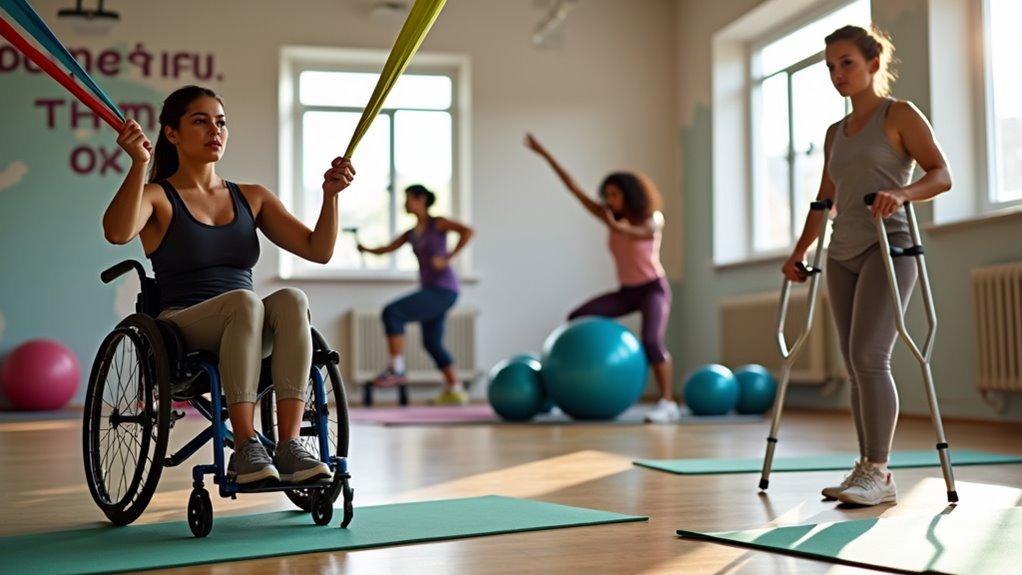
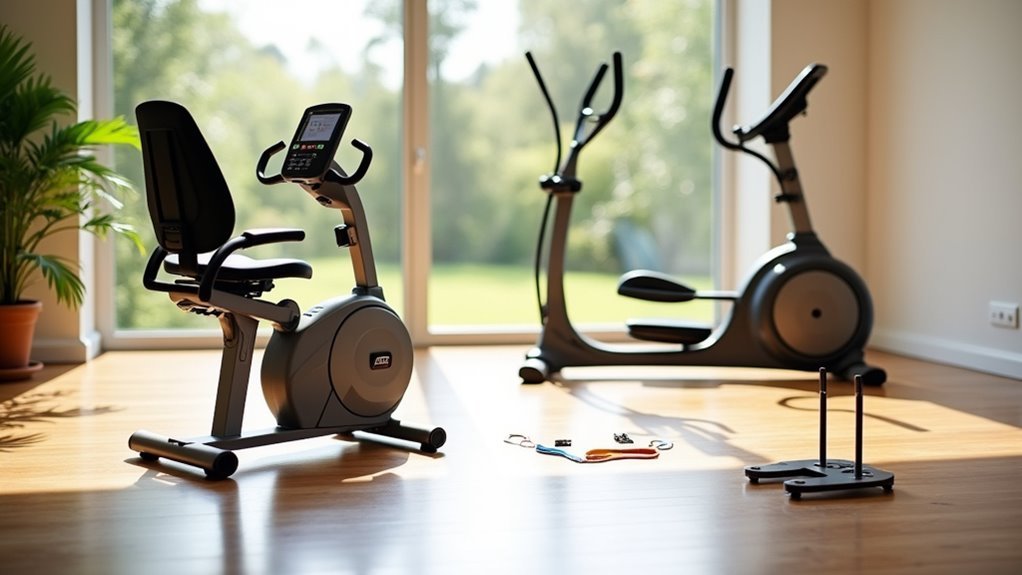
Leave a Reply